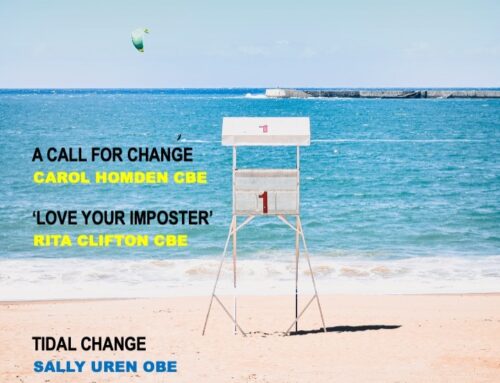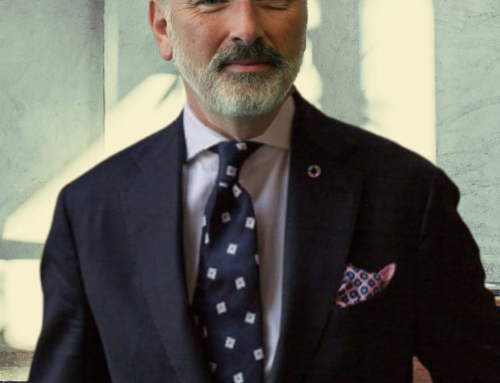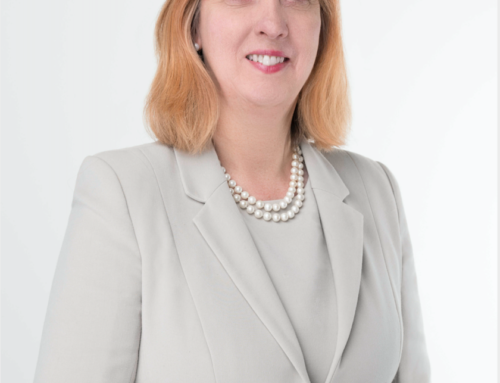Accessibility:
The Disruption Imperative

Caroline Casey participating with other global leaders at the World Economic Forum
Last week, The United Nations said “we have a unique opportunity to design and implement more inclusive and accessible societies”. Coronavirus has forced us to rethink and readjust society and it must be for the better.
When it comes to accessibility, disability inclusion has historically been relegated to the side lines, the ‘poor man’ of diversity, it has been ignored with business and society never recognising the value of almost 1.3 billion people – 15% of the global population.
However, as we begin to enter the next stage of the pandemic, we are now envisioning what the world could look like going forward – and questions are being raised around what we can learn, and how we can create a better world, in business and in society more broadly.
The world has been disrupted like never before. For the first time in centuries, we have been thrown into a state of isolation and exclusion, and it is all beyond our control. As countries across the world have imposed lockdowns, everyone has been forced to experience the same feelings that those with disabilities have felt for years.
Disability inclusion is now in the spotlight and collective empathy for the shared experience of exclusion is being felt, but we need to go further – we need to translate this into action.
The momentum for change is more than just a new understanding of living in an exclusive world. The business world has managed to adapt at an incredible speed – taking on all the new challenges and jumping over hurdles the virus has thrown at us. The workplace has become more flexible than ever, with meetings, conferences and even everyday office life all going online.
Before the pandemic, disability inclusion was not a commonly-used phrase in businesses, having been side lined to CSR and charity. Now, as we are all working from home, and have all become remote workers, the system has proved it can drastically adapt and change.
It calls into question why similar calls and requests have been ignored and why people have been excluded from business for far too long. Businesses have proved they can be flexible and agile. The flexibility and inclusion those with disabilities have been calling on for years are possible and we cannot go back to business as usual after this pandemic. The disruption to the norm has been too great, and the old excuses will no longer stand up to scrutiny.
As we emerge into a new economy, we can also no longer ignore the business case for disability inclusion. The combined annual income of those with a disability, or personally affected by one is $8 trillion – this is an opportunity we can no longer continue missing.
The pandemic has given us a second chance, for leaders and businesses to transform the outdated systems from the inside. This transformation must be spearheaded by business leadership. The global CEO community need to revolutionise disability inclusion through leading by example and proactively enabling access to opportunity.
The power of business leadership is why I launched The Valuable 500 on the main stage of Davos last year. And the appetite is there – we have 270 brands, from 26 countries signed up. That represents a combined revenue of £3.48 trillion with 10 million employees.
In catalysing this transformation, universal design will be more important than ever. The government laid out plans this week which looks at how businesses can begin to return to the workplace. This includes making social distancing possible, updating employee scheduling and partitions. Many of these solutions will need us to redesign our buildings going forward and for this we will need the intelligence and insights of those who have lived experiences of disabilities. Those who know what accessible design is needed. The use of automatic doors, for example. Something initially designed for those with disabilities will now be essential in reducing contact surfaces. This is the perfect example of how a diversity of lived experience can only add value within business.
Disability inclusion needs to be viewed through a much wider lens than just employment, it needs to run throughout the entire value chain. As part of this, businesses must ensure they are also creating accessible services for their customers, and employees. This again has begun to happen throughout lockdown. From cultural and social aspects of life to healthcare systems – they are becoming more inclusive than ever before.
From art galleries to healthcare, national infrastructures have opened up virtually for the first time. Doctors and consultants are now offering their time over skype, something those with disabilities have campaigned for years. Exhibitions, church services and social activities are now accessible for all – with the online community greater than ever.
We have shown that a world in which everyone is included and accepted is possible. We must now ensure we continue with this, from our working environments and businesses to our websites and entertainment – and all the other spaces in between.
It hasn’t been an easy journey – and we never pretended it would be. A new survey released last week has identified an increased negative impact of Covid-19 on those with disabilities. This is largely a manifestation of the continued exclusion people with disabilities have felt. The survey found 51% of people with a disability have either lost their jobs, been laid off or furloughed, compared to 28% of those without a disability.
However, this pandemic has provided a glimpse of a positive new world. We are going to have to reset our business systems and our societies. As we begin to rebuild what the future will look like, it is no longer good enough to not include everyone in this design.
Caroline Casey
Founder, The Valuable 500
http://www.thevaluable500.com
Twitter: @CarolineBinc
Twitter: @500Valuable
LinkedIn: https://www.linkedin.com/company/
thevaluable500/

Accessibility:
The Disruption Imperative

Caroline Casey participating with other global leaders at the World Economic Forum
Last week, The United Nations said “we have a unique opportunity to design and implement more inclusive and accessible societies”. Coronavirus has forced us to rethink and readjust society and it must be for the better.
When it comes to accessibility, disability inclusion has historically been relegated to the side lines, the ‘poor man’ of diversity, it has been ignored with business and society never recognising the value of almost 1.3 billion people – 15% of the global population.
However, as we begin to enter the next stage of the pandemic, we are now envisioning what the world could look like going forward – and questions are being raised around what we can learn, and how we can create a better world, in business and in society more broadly.
The world has been disrupted like never before. For the first time in centuries, we have been thrown into a state of isolation and exclusion, and it is all beyond our control. As countries across the world have imposed lockdowns, everyone has been forced to experience the same feelings that those with disabilities have felt for years.
Disability inclusion is now in the spotlight and collective empathy for the shared experience of exclusion is being felt, but we need to go further – we need to translate this into action.
The momentum for change is more than just a new understanding of living in an exclusive world. The business world has managed to adapt at an incredible speed – taking on all the new challenges and jumping over hurdles the virus has thrown at us. The workplace has become more flexible than ever, with meetings, conferences and even everyday office life all going online.
Before the pandemic, disability inclusion was not a commonly-used phrase in businesses, having been side lined to CSR and charity. Now, as we are all working from home, and have all become remote workers, the system has proved it can drastically adapt and change.
It calls into question why similar calls and requests have been ignored and why people have been excluded from business for far too long. Businesses have proved they can be flexible and agile. The flexibility and inclusion those with disabilities have been calling on for years are possible and we cannot go back to business as usual after this pandemic. The disruption to the norm has been too great, and the old excuses will no longer stand up to scrutiny.
As we emerge into a new economy, we can also no longer ignore the business case for disability inclusion. The combined annual income of those with a disability, or personally affected by one is $8 trillion – this is an opportunity we can no longer continue missing.
The pandemic has given us a second chance, for leaders and businesses to transform the outdated systems from the inside. This transformation must be spearheaded by business leadership. The global CEO community need to revolutionise disability inclusion through leading by example and proactively enabling access to opportunity.
The power of business leadership is why I launched The Valuable 500 on the main stage of Davos last year. And the appetite is there – we have 270 brands, from 26 countries signed up. That represents a combined revenue of £3.48 trillion with 10 million employees.
In catalysing this transformation, universal design will be more important than ever. The government laid out plans this week which looks at how businesses can begin to return to the workplace. This includes making social distancing possible, updating employee scheduling and partitions. Many of these solutions will need us to redesign our buildings going forward and for this we will need the intelligence and insights of those who have lived experiences of disabilities. Those who know what accessible design is needed. The use of automatic doors, for example. Something initially designed for those with disabilities will now be essential in reducing contact surfaces. This is the perfect example of how a diversity of lived experience can only add value within business.
Disability inclusion needs to be viewed through a much wider lens than just employment, it needs to run throughout the entire value chain. As part of this, businesses must ensure they are also creating accessible services for their customers, and employees. This again has begun to happen throughout lockdown. From cultural and social aspects of life to healthcare systems – they are becoming more inclusive than ever before.
From art galleries to healthcare, national infrastructures have opened up virtually for the first time. Doctors and consultants are now offering their time over skype, something those with disabilities have campaigned for years. Exhibitions, church services and social activities are now accessible for all – with the online community greater than ever.
We have shown that a world in which everyone is included and accepted is possible. We must now ensure we continue with this, from our working environments and businesses to our websites and entertainment – and all the other spaces in between.
It hasn’t been an easy journey – and we never pretended it would be. A new survey released last week has identified an increased negative impact of Covid-19 on those with disabilities. This is largely a manifestation of the continued exclusion people with disabilities have felt. The survey found 51% of people with a disability have either lost their jobs, been laid off or furloughed, compared to 28% of those without a disability.
However, this pandemic has provided a glimpse of a positive new world. We are going to have to reset our business systems and our societies. As we begin to rebuild what the future will look like, it is no longer good enough to not include everyone in this design.
Caroline Casey
Founder, The Valuable 500
http://www.thevaluable500.com
Twitter: @CarolineBinc
Twitter: @500Valuable
LinkedIn: https://www.linkedin.com/company/
thevaluable500/




